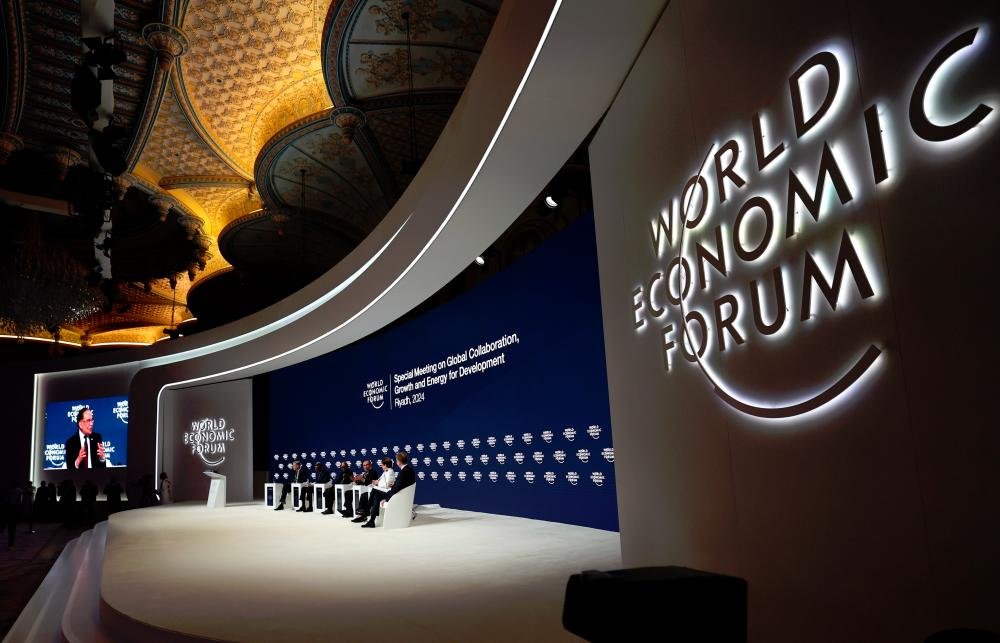
Why in News?
The World Economic Forum (WEF) Annual Meeting 2025 is taking place in Davos, Switzerland. Union Minister Ashwini Vaishnaw is leading the Indian delegation, which includes prominent participants such as Maharashtra Chief Minister Devendra Fadnavis, Telangana Chief Minister Revanth Reddy, and Andhra Pradesh Chief Minister Chandrababu Naidu. The event focuses on fostering discussions on inclusive growth, infrastructure investments, and technology democratization, drawing global leaders from politics, business, and academia.
Introduction
The World Economic Forum (WEF) is a prominent international organization that brings together leaders from politics, business, academia, and civil society to address global challenges. Established in 1971, the forum aims to improve the state of the world by engaging stakeholders to shape global, regional, and industry agendas. Held annually in Davos, the meeting serves as a platform for addressing pressing issues such as economic development, technological advancements, climate change, and social equity.
The 2025 Annual Meeting is particularly significant as it emphasizes key global priorities such as inclusive growth, digital transformation, and investments in social, physical, and digital infrastructure.
Key Highlights of the WEF Annual Meeting 2025
Event Overview
- Dates: January 20–24, 2025.
- Location: Davos, Switzerland.
Key Attendees:
- European Commission President: Ursula von der Leyen.
- China’s Vice Premier: Ding Xuexiang.
- Prominent business leaders, economists, and policymakers.
India’s Participation
- Head of Delegation: Union Minister Ashwini Vaishnaw.
Other Indian Participants:
- Maharashtra Chief Minister Devendra Fadnavis.
- Telangana Chief Minister Revanth Reddy.
- Andhra Pradesh Chief Minister Chandrababu Naidu.
Focus Areas for India:
- Inclusive Growth: Promoting equitable economic progress across regions.
- Infrastructure Investments: Enhancing social, physical, and digital infrastructure.
- Technology Democratization: Making technology accessible and affordable for all.
Focus Areas of Discussion
Inclusive Growth:
- Promoting equitable development globally to bridge economic disparities.
- Addressing income inequality and fostering shared prosperity.
Infrastructure Investment:
- Emphasis on sustainable and resilient infrastructure to drive growth.
- Exploring funding mechanisms for social, digital, and physical infrastructure.
Technology Democratization:
- Ensuring universal access to technological advancements.
- Leveraging innovation to improve governance, education, and healthcare.
Climate Change and Sustainability:
- Strategies for achieving net-zero emissions by mid-century.
- Promoting renewable energy investments and green technologies.
Global Economic Outlook:
- Addressing post-pandemic economic recovery challenges.
- Fostering collaboration to manage global inflation and supply chain disruptions.
Key Terms and Definitions
World Economic Forum (WEF):
- An international organization for public-private cooperation established in 1971.
- Headquartered in Geneva, Switzerland.
- Known for its Annual Meeting in Davos, which serves as a global platform for dialogue on critical issues.
Inclusive Growth:
- An economic framework that ensures equitable distribution of benefits across all sections of society, reducing disparities.
Technology Democratization:
- The process of making technology accessible to all, regardless of socio-economic barriers.
Social Infrastructure:
- Includes facilities and services that improve quality of life, such as healthcare, education, and public housing.
Physical Infrastructure:
- Refers to tangible assets like transportation systems, energy networks, and water supply systems.
Digital Infrastructure:
- Encompasses technological systems like broadband networks, data centers, and cloud computing platforms.
Relevance for India
Global Collaboration:
- Opportunity for India to showcase its digital economy initiatives, including the Digital India Mission.
- Strengthens India’s position as a key player in global policy discussions.
Investment Opportunities:
- Promoting infrastructure projects to attract global investments.
- Highlighting India’s focus on renewable energy and sustainability.
Technological Leadership:
- Demonstrating advancements in technology, including AI-driven governance and digital financial inclusion.
Importance for Competitive Exams
Geopolitical Insights:
- Understanding India’s role in global economic and political discourse.
Economic and Technological Topics:
- Awareness of issues like inclusive growth and technology democratization.
Global Organizations:
- Familiarity with the WEF’s structure, purpose, and relevance.
Climate and Sustainability:
- Knowledge of international efforts to address climate change.
Conclusion
The World Economic Forum’s Annual Meeting 2025 underscores the critical importance of international collaboration in addressing global challenges. India’s active participation highlights its commitment to fostering inclusive growth, infrastructure development, and technology democratization. As a platform that shapes global agendas, the WEF provides India with an opportunity to advance its developmental priorities while contributing to the global dialogue on sustainability and equitable progress. For students and competitive exam aspirants, this event offers valuable insights into global governance, economic policies, and India’s evolving role on the world stage.




